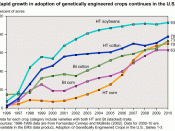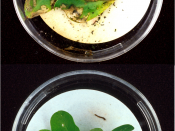In "GM wheat approval called "ÃÂdevastating'"ÃÂ, the Canadian press states that genetically modified wheat could put farmers out of business and destroy Canada's grain export industry. The coalition of farm, health and citizens' groups are calling on the Canadian government not to approve of the genetically modified grain but behind all their doubts is a surplus of superior wheat. Genetically altered wheat will provide a reliable and constant source of wheat and income for farmers along with many other immense benefits.
By genetically altering wheat, we can create a product that is healthier, more nutritious, looks and tastes better. The wheat would be more readily available thorough out the whole year. There would be less tillage needed for the crops that are herbicide tolerant, this means less labor costs. More wheat can be produced using less land, fewer pesticides and less water. It would help solve the problem of world hunger, by creating different and more versatile types of wheat that can grow in scarce land, and that would be more pest resistant and at the same time would put less stress on the environment.
The crop would have a greater range of distinct disease resistant varieties so that a farmer can plant more than one type in each field to prevent against disease attack.
By selecting the most desirable qualities of different plants and animals, mankind began the movement towards genetically altered species by the domestication of animals and the dawn of farming. Until recently the possibility of genetically altering a species has been only a dream, but with the technology of the new millennium the progression of this dream has turned it into reality and it is now within the grasps of anyone to tailor life. Now the only thing holding us back is our imagination.
The largest use of genetic engineering has occurred in the agricultural industry, chemical industries such as Monsanto have been able to make tremendous improvements to plants. Monsanto has been able to produce a plant that is lethal to pests and resistant to certain herbicides.
The Canadian press uses logos throughout their article "Overwhelming numbers of Canadian farmers and consumers, as well as customers for Canadian wheat overseas, have said they do not want GM wheat at this time"ÃÂ This is a good thing, because even though the new GM wheat is ready to be packaged, shipped and sold, some tests are still being run on it.
Genetically modified corn, soybeans and canola are already being sold to farmers, and there doesn't seem to be as much controversy about those products as there is concerning wheat. People all over the world are eating genetically altered animals and fruits. With the new developments that have been discovered, the genetically altered crops can withstand cold temperatures, droughts and disease. Scientists have already made alterations to many different kinds of Canadian crops such as corn, soybeans and canola that have been genetically altered, grown and sold. Weather there are a few more altered types of crop shouldn't matter. The goals for the genetically altered wheat are to produce a more efficient product for farmers, and more nutritious product for consumers.
They also hold more essential nutrients and vitamins, and some are proven to be healthier than their organic counterparts.
The coalition of farm, health and citizens' are against the movement towards genetically altered crops because they feel the new crop has not been tested adequately and because the company seeded many test fields in the Canadian prairies, all in secret locations, encouraging public suspicions. Behind all the doubts to conventional methods of breeding crops, outskirts this new and improved one. Biotechnology lets farmers do breed the crops the same way they have for centuries but with more precision and a greater variety of choice.
There are many complaints that would suggest banning the genetically altered wheat, but there are many more sufficient benefits from the crop. The United States is one of Canada's largest exporters, and they influence many of Canada's decisions. They have been importing and exporting genetically altered crops ever since they have been able to, and they will continue to with wheat. That means all of their exporters will also be getting the genetically altered crops, such as Southeastern Asia, Eastern Asia, South Korea, and Taiwan to name a few. We also export to these some of these countries, therefore only making sense that we also offer them the super crop of the future. The new and improved product might be harder to sell to European countries, but Canada accounts for 20 percent of the worlds export for wheat, all that is needed is some convincing. Once all the pros and cons are laid out on a table in front of you, and once you see all the advantages to genetically altered crops, specifically wheat, they could not resist accepting the export.
"The approval of the GM wheat would be devastating"ÃÂ and also "If the prime minister was to say he is prepared to do whatever it takes to ensure that Canadian farmers and Canadian consumers wouldn't be harmed by the introduction of genetically modified wheat, that would send a very strong signal"ÃÂ are both examples of pathos that is being used in the article.
Genetically altered wheat should be aloud to be grown and harvested in Canada because the results are endless and positive. Farmers wouldn't have to spend as much money tending to their crops, and they could kill unwanted pests and weeds extremely easily. The wheat could be enriched with many different nutrients and vitamins, and it could also stay fresh longer with a better product outlook. Not only would the wheat be more resistant to diseases and fungi's, but it could also be grown in more areas using less water and pesticides. The GM wheat would not be devastating, it would be extraordinary.


